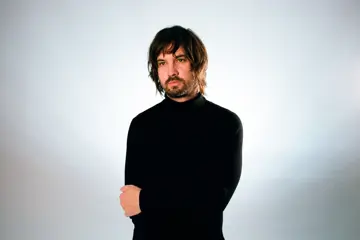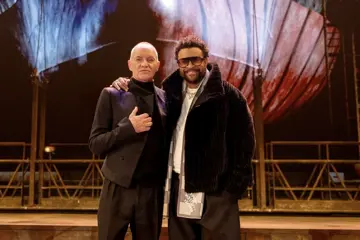Oxford, Mississippi is mostly known for two things: being the home of ‘Ole Miss and writers like William Faulkner.
But football and literature don’t really have much to do with Oxford’s most recent export, the no-holds-barred garage rock of Bass Drum Of Death.
John Barrett and the now three-piece Bass Drum Of Death, with the inclusion of bassist Riley Geare, are currently on their first proper tour of Australia, sharing the bus with local heavyweights DZ Deathrays. “It’s been really great,” Barrett says. “The first time we were here, we only played two shows, so it felt like we were on the plane more than in the country.” He laughs when told he probably did spend more time on a plane. “But just in Melbourne, we’ve played five shows straight, and every one of them was awesome. We’re hoping we get the same response everywhere else.”
They’ve spent months touring internationally on the back of their first studio album. A long-time personal passion for Barrett, Bass Drum Of Death had released two albums before last year’s Rip This – both Barrett solo, both recorded in his basement room with little more than an old laptop and a USB mic. He stated his intent to produce an album professionally after the release of 2013’s self-titled album.
“I knew that I didn’t want to make [Rip This] the same way because I didn’t want to repeat myself. That was the main thing in my mind,” Barrett says. “Len [Clark] had already been my drummer live for a while, so it made sense to get him in and record. And it’s all live; there’s no click track or cuts or anything. So I guess they were the two driving forces for the album, but overall I’ve always stuck to the idea that if it sounds good, then use it. Like with the other records, it was usually the first take and I would just be like, ‘Fuck it, that works.’ I really wanted to keep that kind of dynamic in the studio, so it was important to find someone who would accommodate that.”
Don't miss a beat with our FREE daily newsletter
That someone was Jacob Portrait from Unknown Mortal Orchestra – a bit surprising and not surprising at the same time. You might consider the two bands worlds apart aesthetically, but as Barrett concedes, “It’s incredibly easy to be typecast when you’re in a one, two or three-man band,” Barrett is referring to the constant comparisons to acts like The Black Keys. “It’s always in my mind that I don’t want to sink into complacency when I make music, and changing up the way you do it is really important in that. I know my songs so far have kind of stuck to a formula. But I really want to explore a bit more next time we’re in the studio, you know? Give ourselves more time to work on ideas... and see what we come up with.”















